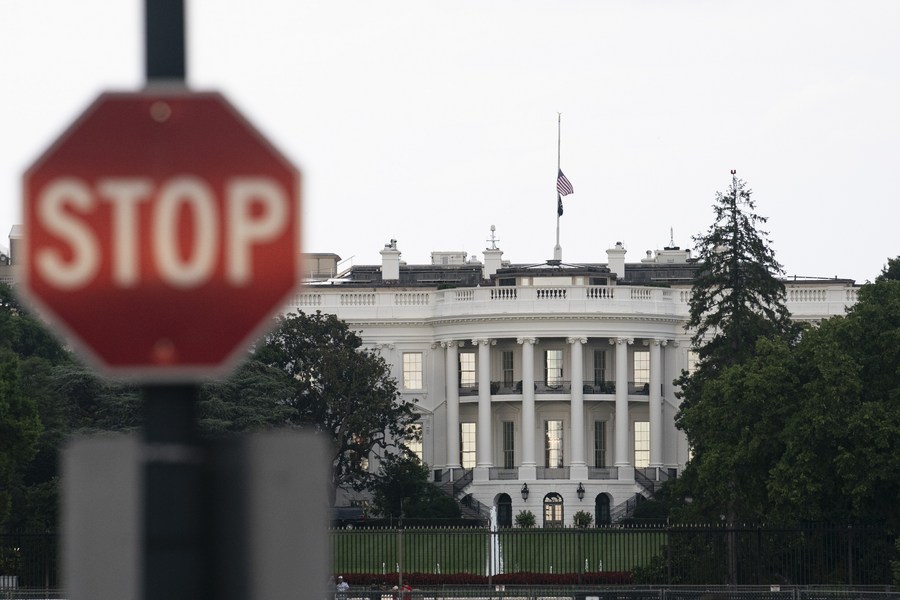
Photo taken on Aug. 4, 2022 shows the White House and a stop sign in Washington, D.C., the United States. (Xinhua/Liu Jie)
BEIJING, Sept. 5 (Xinhua) -- China strongly condemns the cyber attacks launched by the United States on China's Northwestern Polytechnical University, and urges the U.S. side to offer an explanation and immediately stop its unlawful moves, Foreign ministry spokesperson Mao Ning said Monday.
It was reported that China's National Computer Virus Emergency Response Center (CVERC) and cybersecurity company 360 on Monday respectively released investigation reports on the attacks on Northwestern Polytechnical University from the U.S. National Security Agency (NSA), which showed that the NSA-affiliated TAO mounted hundreds of thousands malicious cyber attacks targeting Chinese objectives.
In response, Mao told a daily news briefing that the investigative reports point to another example of the U.S. government's cyber attacks on China.
She said that based on the analysis and tracing done by the joint team of CVERC and 360, the NSA's cyber attacks and data theft against China are supported by a clear and complete chain of evidence, which involves 13 personnel in the United States who directly launched cyber attacks against China, and more than 60 contracts and more than 170 digital documents with U.S. telecom operators to build an environment for cyber attacks.
The reports showed that the United States used 41 specialized cyber weapons to launch cyber theft operations for over 1,000 times against Northwestern Polytechnical University and stole core technical data.
The United States has also long carried out indiscriminate audio surveillance against Chinese cell-phone users, illegally stole text messages from them and conducted wireless positioning of them, she said, adding that the U.S. behavior poses a serious danger to China's national security and citizens' personal information security.
"China strongly condemns this and asks the U.S. side to offer an explanation and immediately stop its unlawful moves," Mao said.
"I want to stress that security of the cyber space is a common issue facing all countries in the world. As the country that possesses the most powerful cyber technologies and capabilities, the United States should immediately stop using its prowess as an advantage to conduct theft and attacks against other countries, responsibly participate in global cyber space governance and play a constructive role in defending cyber security," Mao said.
In response to a query about measures that China will take to better protect its cybersecurity, Mao said this case of cyberattack on China's Northwestern Polytechnical University by the NSA once again shows that safeguarding national cybersecurity is extremely important.
As a major victim of hacking attacks, China is firmly opposed to all forms of cyberattacks, she said, adding that China's laws clearly prohibit all cyber intrusions and damage of information systems.
Mao said that in recent years, China has accelerated top-level design for cybersecurity, formulated and improved strategic planning and legal system in the field of cybersecurity, and continuously enhanced its capacity in cybersecurity protection and cyberspace law enforcement.
"The Chinese people's awareness of cybersecurity has also been continuously raised. This week is the 2022 China Cybersecurity Week. We believe that relevant activities will further enhance the cybersecurity awareness and protection capacity of the whole society, in an effort to build a strong line of defense and create a secure cyberspace," the spokesperson said.
Noting that cybersecurity threats are a common challenge faced by all countries, Mao said that safeguarding cybersecurity is the shared responsibility of the international community.
She added that China adheres to peaceful use of cyberspace, and is ready to work with the international community to step up dialogue and cooperation, oppose hegemony in cyberspace, address all kinds of hacking attacks, maintain peace, security, openness, cooperation and order in cyberspace, foster a multilateral, democratic and transparent international Internet governance system, and work together for a community with a shared future in cyberspace. ■












